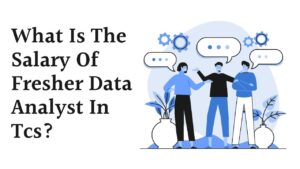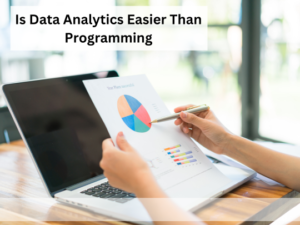Table of Contents
ToggleData analytics encompasses a wide range of activities, and while math plays a significant role, it is not the sole focus. Math provides the foundational principles and techniques that underpin data analytics, but the field is multidisciplinary in nature. It involves combining mathematical concepts, statistical methods, and computational tools with domain knowledge and critical thinking skills to extract insights and make informed decisions based on data.
Learn the core concepts of Data Analytics Course video on Youtube:
Data analytics involves various stages, including data collection, data cleaning and pre-processing, exploratory data analysis, statistical modelling, machine learning, data visualization, and communication of findings. While mathematical concepts like probability, calculus, linear algebra, and statistics are essential for understanding and applying these techniques, they are not the only aspects involved.
Data analytics also requires skills such as data wrangling, programming, data interpretation, problem-solving, and effective communication. These skills help analysts frame the right questions, design appropriate analyses, interpret results, and communicate insights to stakeholders effectively.
Moreover, data analytics is not limited to math and statistics alone. It often draws on other fields such as computer science, data engineering, business, economics, and social sciences to gain a holistic understanding of the data and its context.
While math is a fundamental component of data analytics, it is not the sole focus. Data analytics incorporates a combination of mathematical principles, statistical methods, computational tools, domain knowledge, and critical thinking skills to derive meaningful insights from data.
In addition to the multidisciplinary nature of data analytics, it’s important to recognize that data analytics is not solely about crunching numbers or performing complex mathematical calculations. Here are some other aspects of data analytics that go beyond pure math:
Data Exploration and Visualization
Data analysts often spend a significant amount of time exploring and understanding the data they are working with. This involves using visualization techniques to gain insights, identify patterns, and uncover relationships within the data. While some mathematical concepts may be used to create visualizations, the emphasis is on effective data representation rather than complex math.
Data Cleaning and Pre-processing
Data collected for analysis is rarely perfect. Data analysts need to pre-process and clean the data to remove errors, missing values, outliers, and inconsistencies. While some statistical techniques may be used to identify and handle these issues, data cleaning and pre-processing involve more practical considerations and domain knowledge.
Domain Knowledge and Context: Data analysts must have a deep understanding of the domain they are working in to ask the right questions, interpret the results accurately, and provide meaningful insights. This requires knowledge beyond mathematical concepts, such as understanding business processes, industry trends, customer behaviour, or scientific principles.
Problem Formulation and Experimental Design: Before applying mathematical and statistical techniques, data analysts need to define the problem they are trying to solve and design appropriate experiments or analyses. This involves critical thinking, creativity, and decision-making skills, as well as an understanding of the broader context and goals.
Communication and Presentation: Data analysts must effectively communicate their findings and insights to various stakeholders, including non-technical audiences. This requires strong communication skills, storytelling abilities, and the capability to translate complex analyses into actionable insights. Effective communication involves more than just math; it involves explaining concepts, visualizing results, and connecting with the audience.
Data Collection and Integration: Data analytics involves gathering relevant data from various sources, which may include structured databases, unstructured text, images, sensor data, or social media streams. Integrating and transforming this data into a usable format often requires data engineering and data management skills, which go beyond pure mathematics.
Machine Learning and Algorithms: While mathematics is integral to understanding machine learning algorithms, data analytics encompasses more than just math. It involves selecting, training, and evaluating machine learning models to solve specific problems or make predictions. This process also involves feature engineering, model selection, hyperparameter tuning, and assessing model performance, which require a combination of mathematical understanding, programming skills, and domain knowledge.
Ethical Considerations and Data Privacy: Data analytics practitioners must be aware of ethical considerations and legal regulations surrounding data privacy. Understanding the ethical implications of data usage, ensuring data anonymity and security, and complying with relevant regulations are crucial aspects of responsible data analytics. These considerations involve ethical reasoning, legal knowledge, and policy awareness, which go beyond mathematical calculations.
Decision-Making and Business Acumen: Data analytics aims to provide insights and support decision-making processes. It requires an understanding of business goals, organizational context, and strategic thinking. Data analysts need to align their findings with business objectives, communicate the impact of their insights, and assist in making data-driven decisions. These skills involve more than just mathematical expertise; they require a broader understanding of the business landscape.
Iterative and Agile Processes: Data analytics often involves an iterative and agile approach, where analysts refine their analysis based on feedback, test hypotheses, and adapt their methods. This iterative process requires flexibility, problem-solving abilities, and the willingness to explore alternative approaches. While mathematics provides a foundation, the focus shifts to experimentation, iteration, and continuous improvement.
Data Interpretation and Contextual Understanding: Data analytics involves more than just performing mathematical calculations. It requires the ability to interpret the results in the context of the problem being solved or the question being addressed. Understanding the limitations of the data, identifying potential biases, and considering external factors are crucial for drawing meaningful conclusions.
Storytelling and Narrative: Effective data analytics involves telling a compelling story with data. It requires the ability to communicate findings in a narrative format, using data visualizations, reports, or presentations. This storytelling aspect goes beyond mathematical calculations and involves creativity, communication skills, and the ability to engage and persuade the audience.
Data Strategy and Planning: Data analytics involves strategic thinking and planning to ensure that the analysis aligns with the overall goals and objectives of an organization. This includes identifying key metrics, defining success criteria, and determining the appropriate data sources and analytical techniques to achieve desired outcomes. It requires a combination of analytical skills, business acumen, and problem-solving abilities.
Data Science Placement Success Story
Data Governance and Quality Assurance: Data analytics requires ensuring data integrity, quality, and reliability. This involves understanding data governance principles, implementing data quality checks, and verifying the accuracy and consistency of the data. While some statistical techniques may be used for data validation, it also requires attention to data management practices, data lineage, and data documentation.
Data Science Training Institutes in Other Locations
Tirunelveli, Kothrud, Ahmedabad, Hebbal, Chengalpattu, Borivali, Udaipur, Trichur, Tiruchchirappalli, Srinagar, Ludhiana, Shimoga, Shimla, Siliguri, Rourkela, Roorkee, Pondicherry, Rajkot, Ranchi, Rohtak, Pimpri, Moradabad, Mohali, Meerut, Madurai, Kolhapur, Khammam, Jodhpur, Jamshedpur, Jammu, Jalandhar, Jabalpur, Gandhinagar, Ghaziabad, Gorakhpur, Gwalior, Ernakulam, Erode, Durgapur, Dombivli, Dehradun, Cochin, Bhubaneswar, Bhopal, Anantapur, Anand, Amritsar, Agra , Kharadi, Calicut, Yelahanka, Salem, Thane, Andhra Pradesh, Greater Warangal, Kompally, Mumbai, Anna Nagar, ECIL, Guduvanchery, Kalaburagi, Porur, Chromepet, Kochi, Kolkata, Indore, Navi Mumbai, Raipur, Coimbatore, Bhilai, Dilsukhnagar, Thoraipakkam, Uppal, Vijayawada, Vizag, Gurgaon, Bangalore, Surat, Kanpur, Chennai, Aurangabad, Hoodi,Noida, Trichy, Mangalore, Mysore, Delhi NCR, Chandigarh, Guwahati, Guntur, Varanasi, Faridabad, Thiruvananthapuram, Nashik, Patna, Lucknow, Nagpur, Vadodara, Jaipur, Hyderabad, Pune, Kalyan.
Data Analyst Courses In Other Locations
Tirunelveli, Kothrud, Ahmedabad, Chengalpattu, Borivali, Udaipur, Trichur, Tiruchchirappalli, Srinagar, Ludhiana, Shimoga, Shimla, Siliguri, Rourkela, Roorkee, Pondicherry, Rohtak, Ranchi, Rajkot, Pimpri, Moradabad, Mohali, Meerut, Madurai, Kolhapur, Khammam, Jodhpur, Jamshedpur, Jammu, Jalandhar, Jabalpur, Gwalior, Gorakhpur, Ghaziabad, Gandhinagar, Erode, Ernakulam, Durgapur, Dombivli, Dehradun, Bhubaneswar, Cochin, Bhopal, Anantapur, Anand, Amritsar, Agra, Kharadi, Calicut, Yelahanka, Salem, Thane, Andhra Pradesh, Warangal, Kompally, Mumbai, Anna Nagar, Dilsukhnagar, ECIL, Chromepet, Thoraipakkam, Uppal, Bhilai, Guduvanchery, Indore, Kalaburagi, Kochi, Navi Mumbai, Porur, Raipur, Vijayawada, Vizag, Surat, Kanpur, Aurangabad, Trichy, Mangalore, Mysore, Chandigarh, Guwahati, Guntur, Varanasi, Faridabad, Thiruvananthapuram, Nashik, Patna, Lucknow, Nagpur, Vadodara, Jaipur, Hyderabad, Pune, Kalyan, Delhi, Kolkata, Noida, Chennai, Bangalore, Gurgaon, Coimbatore.
For more information
360DigiTMG – Data Analytics, Data Science Course Training Hyderabad
Address – 2-56/2/19, 3rd floor,,
Vijaya towers, near Meridian school,,
Ayyappa Society Rd, Madhapur,,
Hyderabad, Telangana 500081
099899 94319
https://goo.gl/maps/sn21C9xFtMbCr4qm8
Source Link : What are the Best IT Companies in Uppal


